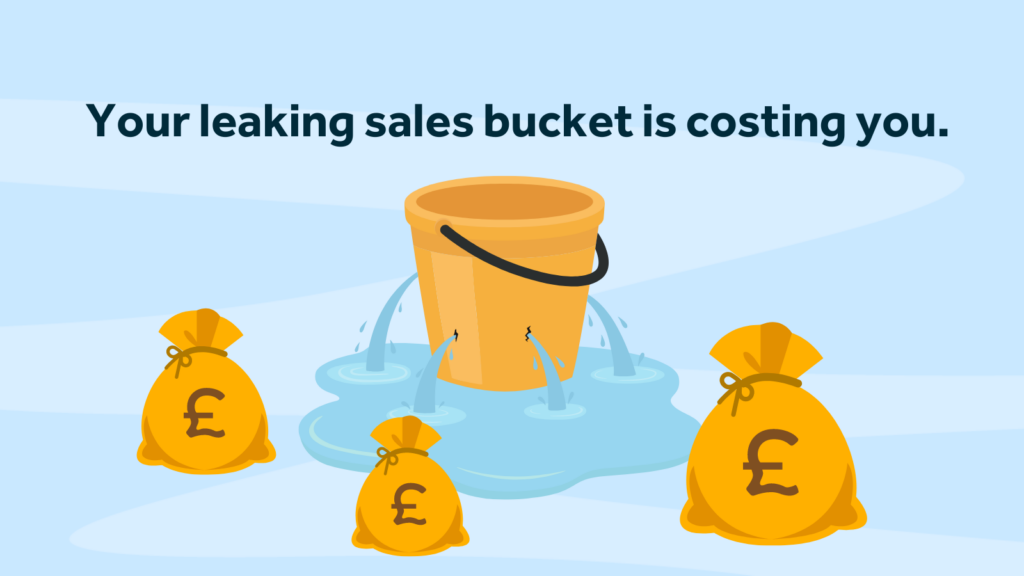What do you expect in terms of sales conversions for your industry? Do you think you’re performing to industry benchmarks? For context, you should expect the B2B conversion rate of sales leads to be anything from 1 to 5 %, which varies depending on the industry and product or service you offer. If you’re metrics fall short, discover how to increase sales conversions with CRM software.
Of course, your sales processes and lead-handling capabilities also hugely impact conversion rates. So, while you can expect lower numbers as leads move down the sales funnel, you can mitigate the loss percentage by better managing each part of the sales funnel.
And whilst every organisation will have a leaky sales bucket to some extent, some will have more holes than others. The critical consideration for you, then, is “How leaky is your sales bucket?”
The sad fact is that even if you have healthy marketing budgets and acquire a steady stream of inbound and outbound leads, this investment is wasted unless you have tight sales pipeline management. Your sales processes and systems could be the weakest link in the chain, harming your sales conversions and business win rate.
Before we blame the sales operation, we need to consider the tools you are giving them. Teams burdened with slow processes, laborious, time-consuming admin, manual tasks, and outdated systems will not be able to work as efficiently as those with access to time-saving technology. Time spent on admin is time away from sales activity; less activity results in slower and smaller pipelines and, ultimately, lower sales revenue.
So fixing the efficiency problem and helping the sales team do more in the same time will undoubtedly result in better sales performance.
And whilst efficiency and speed are critical, so is effectiveness. The more effectively your sales team manages your sales pipeline – the better their conversions and win rates. It stands to reason that the more thorough and tenacious someone is in their sales efforts, the more successful they will be. Again, technology and processes play a big part in modern selling practices and helping sales professionals be thorough and effective. Specific technological tools can help sales teams view and manage the pipeline accurately, which is a huge advantage. Less is left to chance, and no stone is left unturned.
Even a once-leaky bucket can deliver much less wastage when the right customer relationship management (CRM) platform is in place.
How to increase sales conversions
Here are four ways in which a CRM can reduce a leaky sales bucket, improve sales conversions and help grow sales:
1)Streamlined administration and automation
A centralised database enables salespeople to access information on leads and existing customers quickly. Less time spent hunting around in files and drives is more time spent on sales activity that matters and makes a difference. Add to this email and multi-system integration means efficient day-to-day activities. Efficiency is accelerated further by automated administration tasks and alerts across teams. You’ll find that most modern CRMs integrate seamlessly with Outlook 365 and Gmail. So that emails, meetings, and calls are logged automatically, with no unnecessary data entry.
This increase in capacity means one salesperson has more time to handle more leads and contribute to a fuller pipeline. The more leads in the pipeline, the more new business is won.
2) Better inbound marketing activity
A CRM with a marketing platform can transform your engagement with potential clients. You can build trust and authority by nurturing inbound leads with relevant and valuable content. Imagine educating potential clients on a topic that is important to them. Show them how to be more effective in their role in relation to your product or service.
Show them how to be more successful and educate them through email marketing and retargeting campaigns, and you will be helping them gain confidence in your brand. And whilst only 5% of businesses are ever in the market to buy at any one time, engaging with prospective customers early in the buying cycle makes sense. If you have established yourself as the knowledgeable and go-to solution for your corner of the market, you are more likely to be the solution of choice when they are ready to purchase, even if that is years after they first engaged with you. In doing this, you will be assisting sales with quality, engaged leads.
3) Detailed analytics and reporting for sales managers
Good sales management can result in a more motivated and effective sales team, and the key to supporting the team in achieving success is the visibility of sales activity and pipeline reports. CRM platforms offer this and empower leaders and management to make the right decisions and coach their teams directly.
With real-time reporting dashboard and BI tools, sales managers can view what is and isn’t working and who is and isn’t driving sales effectiveness. That way, you can focus coaching and training efforts on those who need them most and direct team efforts to the most effective sales activity. Overall, the sales function will be more effective and successful and more likely to achieve and exceed its targets.
4) Better sales and marketing collaboration
A CRM with both sales and marketing modules opens the door to better cross-functional collaboration.
Since time began (OK, we exaggerate there; it just feels like a very long time), siloed working between sales and marketing has hampered growth. But that is slowly becoming a thing of the past, as modern CRM enable better visibility of activities for both functions.
Having visibility of past communications and touchpoints can be very powerful for sales teams. Imagine this: a salesperson receives a lead allocation and can not only see that a lead has been interacting with their brand for two years, but they can also see what articles they have viewed and what emails they have received and opened. What virtual and in-person events have they interacted in? This insight helps the salesperson tailor their approach to this lead and understand better what the potential customer is interested in.
Plus, sales can align their messaging and tactics to marketing activities and messaging so that the message the potential customer receives is consistent, and as we know, consistency is key.
In short, CRMs transform sales operations by improving conversion rates at each part of the sales funnel, essentially making a ‘leaky sales bucket’ less leaky.
If you are interested in how to increase sales conversions with CRM and drive growth in your organisation, visit rocketcrm.com for a wealth of information on CRM and Dynamics 365.
About Rocket CRM
Rocket CRM is a Microsoft Dynamics 365, and a platinum Click accredited partner, helping small to medium-sized businesses and charities harness the power of scalable CRM technology. Our mission is to make powerful CRM software simple with custom-built, user-focused solutions.
Website: rocketcrm.co.uk
Podcast: RocketPod
Social: LinkedIn




